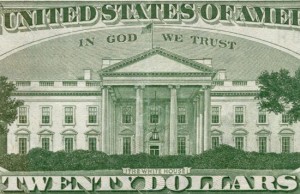 WASHINGTON — A federal judge has tossed a lawsuit filed earlier this year that sought to remove the motto ‘In God We Trust’ from American currency.
WASHINGTON — A federal judge has tossed a lawsuit filed earlier this year that sought to remove the motto ‘In God We Trust’ from American currency.
As previously reported, well-known atheist Michael Newdow, who has filed numerous suits challenging the mixture of God and government, submitted a complaint in the Southern District of New York this past March, asserting that the motto violates the Establishment Clause of the United States Constitution as it serves to proselytize unbelievers.
“[T]he American dollar travels all over the world, into every country of the world, and frequently gets behind the Iron Curtain, and if it carries this message in that way, I think it would be very good,” Newdow quotes Pennsylvania Representative Herman P. Eberharter as stating during his tenure in Congress. “I think that is one of the most compelling reasons why we should put it on our currency. … The principles laid down by God and the teachings of our way of life should be kept alive in the hearts and minds of our friends enslaved behind the Iron Curtain.”
Those named in the lawsuit, which included seven children and their parents, along with other singular entities and the group New York City Atheists, remarked that they do not like being forced to look at the name of God on their currency every time they make a purchase. They contended that it makes them feel discriminated against and rejected by society because they have rejected the Creator.
However, on Monday, U.S. District Court Judge Harold Baer, Jr., nominated by Bill Clinton, rejected the arguments of the plaintiffs and Newdow, opining that “the inclusion of the motto on U.S. currency . . . does not violate the Establishment Clause [of the Constitution].”
“The Supreme Court has repeatedly assumed the motto’s secular purpose and effect, and all circuit courts that have considered this issue – namely the Ninth, Fifth, Tenth, and D.C. Circuit – have found no constitutional violation in the motto’s inclusion on currency,” Baer wrote. “[The plaintiffs] may be inconvenienced or offended by the appearance of the motto on currency, these burdens are a far cry from the coercion, penalty, or denial of benefits required under the ‘substantial burden’ standard [in case law].”
Following the ruling, the American Center for Law and Justice (ACLJ), which had represented 41 members of Congress in an Amicus brief, praised the ruling.
“The decision is welcomed and well-reasoned,” commented Jay Sekulow, Chief Counsel of the ACLJ, in a statement. “Time after time, flawed legal challenges like this one are brought by atheists, and time after time, the courts soundly reject their attempts to change the historical and cultural landscape of America. In our amicus brief on behalf of members of Congress and nearly 90,000 Americans, we argued that the national motto poses no constitutional violations and must be dismissed. We’re extremely pleased that the court did just that.”
The motto “In God We Trust” has appeared on U.S. coins since 1864 and began being printed on paper currency in 1957. The phrase is to believed to have originated with the Star Spangled Banner, written during the War of 1812, which declares, “And this be our motto: In God We Trust!”
Following a Civil War-era proposal from a number of pastors to the U.S. Treasury Department that God be acknowledged on American currency, Treasury Secretary Salmon P. Chase obliged and ordered that a design be created. Its inscription was first upheld by Congress in 1864, and then again in 1873 when Congress passed the Coinage Act, which specifically declared that the secretary “may cause the motto ‘In God We Trust’ to be inscribed on such coins as shall admit of such motto.”
In 1956, Congress passed a resolution making “In God We Trust” the national motto, which was again upheld by the U.S. House of Representatives in 2011 by a 396-9 vote.
Become a Christian News Network Supporter...


